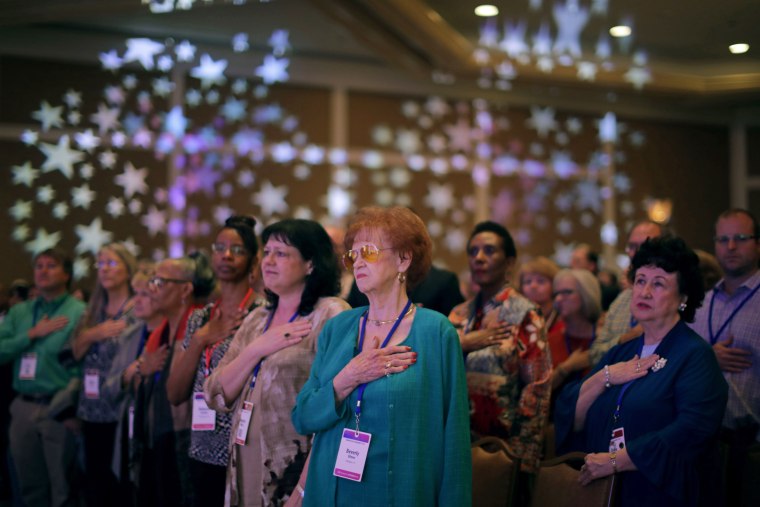In today’s heightened culture war, the coffers of the anti-gay movement are overflowing. According to publicly available annual returns, 11 nonprofit groups identified as anti-LGBTQ hate groups by the Southern Poverty Law Center took in over $110 million in contributions during the financial year ending in 2020.
The dollar amount represents a recent high-water mark for the organizations, whose take of donations, grants and other noncash contributions has increased steadily since 2016, when the same 11 groups reported more than $87 million in such contributions.
In just four years, their total revenue swelled by over 25 percent, with some indication that the positive trend continued into 2021. The multimillion-dollar war chest has bolstered a movement that just a few years ago appeared to be losing ground in America’s decadeslong culture war around lesbian, gay, bisexual, transgender and queer rights. Far from retreating, the groups have won significant battles at all levels of American government and society — from local school boards to the federal courts.
The Southern Poverty Law Center, or SPLC, based in Montgomery, Alabama, has tracked the anti-LGBTQ movement for more than a decade. In 2011, the SPLC published its first list of 13 “hate groups” that propagate known falsehoods and pseudoscience to disparage gender and sexual minorities. Since 2020, the organization has been tracking more than 40 entities, of which many engage in a host of issues beyond LGBTQ rights, like abortion and Covid-related mandates. Several groups are also churches, which are exempt from filing annual returns and therefore do not disclose their finances.
Many of these groups assert that LGBTQ people are a threat to society itself. "
Scott McCoy, southern poverty law center
Then, as now, a loose affiliation of fundamentalist churches, conservative law centers and far-right advocacy organizations makes up the anti-LGBTQ movement.
“Many of those, while not specifically tied to a church, are rooted in the conservative Christian, biblical sense of human sexuality,” said Scott McCoy, the interim deputy legal director for LGBTQ rights and special litigation for the SPLC and the SPLC Action Fund, the group’s political action committee.
But simply holding a religious belief that views homosexuality or transgender identity as sinful does not automatically land a church or an organization on the SPLC’s list of hate groups.
“Many of these groups assert that LGBTQ people are a threat to society itself. That kind of extremist rhetoric and belief is part of what goes into our decision-making process,” McCoy said. He also pointed to groups that justify violence against LGBTQ people, like Westboro Baptist Church.
'The hard core of the anti-gay movement'
When the SPLC began tracking anti-LGBTQ hate in the early 2010s, the organization noted that “a small coterie of groups now comprise the hard core of the anti-gay movement.” The same groups — many now flush with financial resources — continue to shape the anti-LGBTQ agenda.
“As of today, there probably are five or six key players,” McCoy said, highlighting the Family Research Council, the Alliance Defending Freedom, Liberty Counsel and the American College of Pediatricians as parts of the core.
From 2011 to 2021, the total revenue of the Family Research Council — an advocacy organization based in Washington, D.C., that, according to its website, believes “homosexual conduct is harmful to the persons who engage in it” and “is also harmful to society at large” — jumped from over $12 million to more than $23 million.
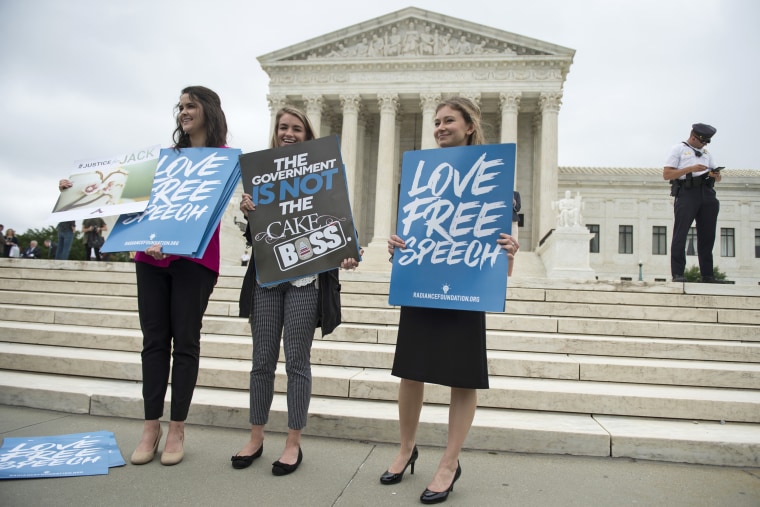
During the same period, contributions to the Alliance Defending Freedom, which is based in Scottsdale, Arizona, more than doubled, from over $34.5 million in 2011 to more than $76 million in 2021. According to its website, the group aims to secure “generational wins” to ensure “the law respects God’s creative order for marriage, the family, and human sexuality.”
In a statement, Jeremy Tedesco, the senior counsel and senior vice president of corporate engagement at the Alliance Defending Freedom, touted its judicial track record and alleged that the SPLC has “destroyed its own credibility because of its blatant partisan agenda.”
“Alliance Defending Freedom is among the largest and most effective legal advocacy organizations dedicated to protecting the religious freedom and free speech rights of all Americans. Our record since 2011 includes 13 Supreme Court victories, including two wins last year and one upcoming case next term,” Tedesco said. “Our track record of success is due in large part to those who generously support our work, and increased giving demonstrates the growing movement to protect Americans’ First Amendment freedoms.”
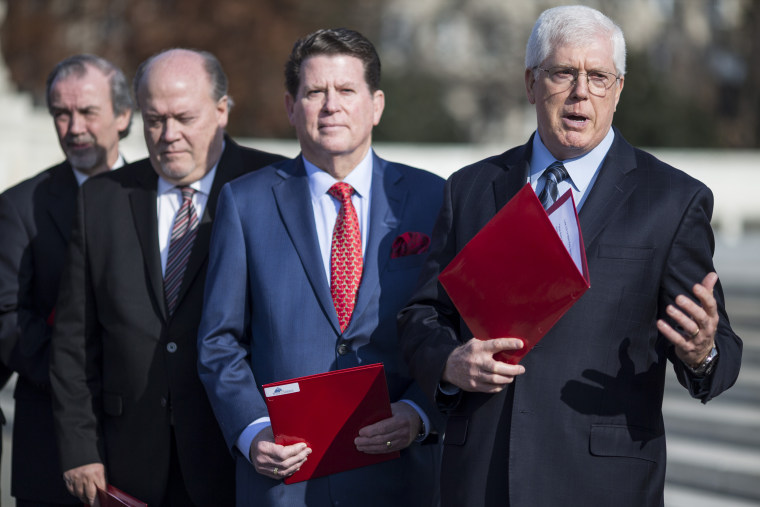
Mat Staver, founder and chairman of Liberty Counsel, based in Orlando, Florida, said that the organization is “neither anti-LGBTQ nor a hate group” and that the SPLC’s “self-appointed hate group list is false and defamatory.”
“We hate no one and oppose violence and demeaning language or behavior towards anyone,” Staver said in a statement. “We believe every person is created in the image of God and has inherent dignity and value. Liberty Counsel believes everyone is entitled to religious freedom and freedom of speech.”
The Family Research Council and the American College of Pediatricians did not respond to requests for comment. They have previously rejected the accusation that they are hate groups.
'Outliers' who 'wield a pretty big hammer'
The significant flows of contributions to the groups, however, do not reflect a growing antagonism toward the LGBTQ community in broader American society.
Survey after survey confirms that Americans of many different political stripes and religious affiliations have become more supportive of LGBTQ rights over the past decade. According to the 2021 American Values Atlas, more than two-thirds (68 percent) of Americans supported same-sex marriage last year, up from 47 percent a decade before. That included majorities of historically conservative religious groups, like Catholics and Orthodox Christians, and nearly half of all Republicans.
The same survey found even greater public support for protections against discrimination in the workplace and public accommodations for LGBTQ people. In 2021, the American Values Atlas reported that 79 percent of respondents supported such protections.
One group in the American Values Atlas continues to lag behind the rest of the country when it comes to affirming LGBTQ equality: white evangelical Protestants, whose fringe, far-right elements comprise the core of the anti-LGBTQ movement in the U.S. today.
“As someone who writes social science, I can’t tell you how many sentences I have begun with the words ‘with the lone exception of white evangelical Protestants,’” said Robert P. Jones, the CEO and founder of the Public Religion Research Institute, or PRRI, the organization behind the American Values Atlas. “Whether it is on immigration, LGBTQ issues, abortion — white evangelical Christians are increasingly outliers to the middle of the country, not just to the left.”
Jones, a scholar of white Christianity in the U.S., has spent years tracking the cultural and political power of white evangelical Protestants.
“I think the biggest marker of change among white evangelicals over the last decade has just been the internal shifts that they have undergone,” Jones said. “They have shrunk by nearly a third just over the last decade. Today, they are 14.5 percent of the population. And as they have shrunk, they have been hemorrhaging young people. I think that is one of the reasons why they have become increasingly out of step with the middle of the country.”
Despite the bleed of parishioners, white evangelicals have managed to maintain their power in electoral politics by solidifying their stake in the Republican Party. Between 2016 and 2020, Pew Research Center found that white evangelical voters’ support of President Trump rose from 77 percent to 84 percent. Although this voting bloc only accounted for 19 percent of the total electorate in 2020, it made up 34 percent of all Trump voters.
“When you’re a third of one party’s base, you wield a pretty big hammer,” Jones said.
Without the broad support of white evangelicals, Pew Research Center observed, Trump would have lost to Joe Biden by more than 20 points in the last presidential election.
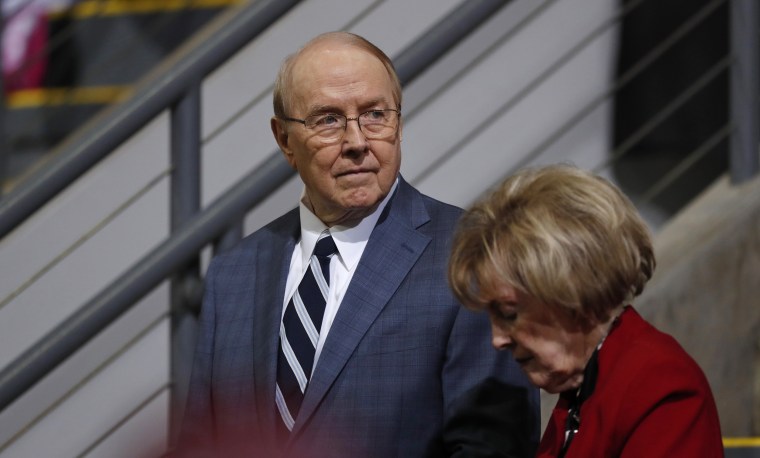
From the start of his foray in national politics, Trump made an effort to woo this key constituency. In 2016, during his first run for the Oval Office, Trump formed a so-called evangelical executive advisory board to help shape his political platform. Among the people in the group of advisers were heavy hitters in evangelical Christianity, as well as the anti-LGBTQ movement, including James Dobson, an Alliance Defending Freedom co-founder and the founder and former leader of the fundamentalist Christian organization Focus on the Family.
“We saw this shift throughout Trump’s presidency — and it has certainly lasted past it — of the term ‘evangelical’ becoming more of a political signifier than it is a religious one, that being almost a stand-in for white, Christian nationalist beliefs,” said Maggie Siddiqi, the senior director of Religion and Faith at the Center for American Progress, a progressive think tank.
It was not just Trump who welcomed evangelical leaders into the highest levels of politics and policy. In 2018, then-Senate Majority Leader Mitch McConnell, R-Ky., appointed Family Research Council President Tony Perkins to the U.S. Commission on International Religious Freedom, an independent, bipartisan commission created by the International Religious Freedom Act of 1998 that is “dedicated to defending the universal right to freedom of religion or belief abroad.” At the time, Heidi Beirich, then the director of the SPLC’s Intelligence Project, called Perkins’ appointment “deeply disturbing.” His current term on the commission expires in May.
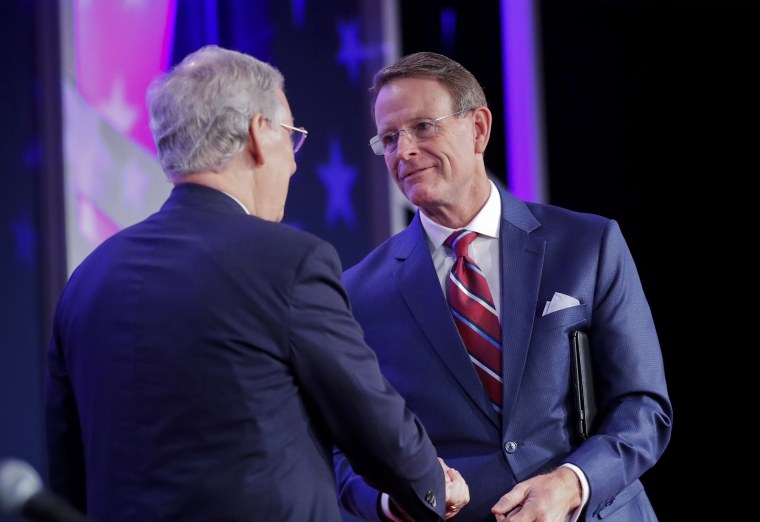
Siddiqi noted that among evangelicals, there is some noted resistance to marrying faith with contemporary American politics. For example, in 2019, the Baptist Joint Committee for Religious Liberty launched the campaign Christians Against Christian Nationalism, which, among other tenets, holds that “conflating religious authority and political authority is idolatrous and often leads to oppression of minority and other marginalized groups.”
Still, conservative white evangelicals have found in the modern Republican Party champions for a political agenda that extends well beyond LGBTQ rights. On issues of abortion, religious freedom and, more recently, Covid vaccination mandates, today’s GOP has aligned itself with the interests of many white evangelicals, affording the group outsized power in the U.S.’s two-party political system.
With so many evangelicals flocking to one side of the political spectrum, Jones said, they have “yielded disproportionate influence in the public, by leveraging a political party.”
A strategic 'pivot'
At the same time, the political arenas where conservatives and progressives battle over LGBTQ rights and other fraught social issues have continued to evolve.
“There’s been a focus downward to more local places like school boards, boards of health, bodies of that nature,” said McCoy of the SPLC. “Now they are taking up the latest fault lines in the culture war, whether it be mask mandates, LGBTQ school policies or even critical race theory.”
There has also been “a pivot” to targeting the transgender community, said Sharita Gruberg, the vice president for the LGBTQI+ Research and Communications Project at the Center for American Progress.
“The groups that are opposed to LGBTQ equality did their message testing and found that attacking gay people is no longer the broadly popular culture war totem that they used in the ’90s,” Gruberg said. “From the bathroom bills in 2015 and 2016 to the bans on trans kids playing school sports, it is easier for these groups to frame attacks to focus on trans kids paired with policies that they say are restoring parental rights. It’s a bit of a Trojan horse.”
The Parental Rights in Education bill — dubbed the “Don’t Say Gay” bill by its critics — which is on Florida Gov. Ron DeSantis’ desk, is a case in point. If it is signed into law, it would prohibit “classroom discussion about sexual orientation or gender identity” in the state’s primary schools. Opponents say the law would harm LGBTQ youths by creating an antagonistic educational environment. But Republican state Rep. Joe Harding, who introduced the bill in the House in January, contends the measure is about “empowering parents.”
Last month, Harding defended his bill in a blog post for the Family Research Council, an SPLC-designated anti-LGBTQ hate group since 2011.
Gruberg contends that protecting LGBTQ rights nationwide would require federal intervention. Congress is considering the Equality Act, which would amend the Civil Rights Act of 1964 to prohibit discrimination on the basis of sex, sexual orientation and gender identity. But passage of the law is far from ensured: All Democratic-voting senators and 10 Senate Republicans would need to vote in favor of the measure to overcome the filibuster.
Even then, the law could still meet its demise in the courts. While the Supreme Court has a history of affirming LGBTQ rights, conservatives now command a solid majority.
The most recent addition to the court, Justice Amy Coney Barrett, even has a past with members of the anti-LGBTQ movement. From 2011 to 2016, Barrett gave lectures on five different occasions to the Blackstone Legal Fellowship, the Alliance Defending Freedom’s flagship summer program for Christian law students. During her confirmation hearing in 2020, Barrett described her experience with the Blackstone Legal Fellowship as a “wonderful one” but also said that “nothing about any of my interactions … were ever indicative of any kind of discrimination on the basis of anything.”
For Jones, the pace at which LGBTQ equality has advanced has created a “last stand mentality” among white Christian conservatives, who have worked diligently over the decade to shore up their power on the federal bench.
“It’s that dynamic that is driving the fundraising,” he said. “There’s a kind of last-stand desperation, an apocalyptic feeling that if we don’t do something now, we will lose the country. And if we don’t do something to win it back, there will never be another opportunity.”
